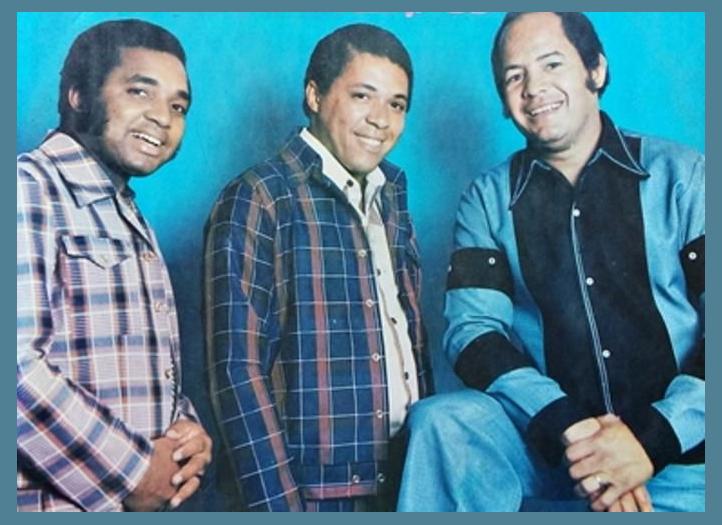 Oliveira, Oliveirinha e Luiz Conceição
Oliveira, Oliveirinha e Luiz Conceição
Oliveira, Oliveirinha e Luiz Conceição: A Musical Odyssey Marked by Triumphs and Trials
In the annals of Brazilian music, the trio of Oliveira, Oliveirinha, and Luiz Conceição stands as an iconic force, renowned for their poignant and soulful renditions of the classic song "Adeus Amor." Their musical journey has been marked by both triumphs and challenges, weaving a tapestry of artistry and controversy that continues to captivate listeners to this day.
Members and Musical Roots
Oliveira (born Olavo Barbosa da Silva), Oliveirinha (real name Luiz Oliveira), and Luiz Conceição embarked on their musical endeavors in the bustling city of São Paulo in the 1940s. Oliveira, a gifted composer and singer, formed the core of the trio, while Oliveirinha's brilliant guitar playing and Conceição's soulful vocal harmonies added depth and richness to their sound.
The Birth of "Adeus Amor"
The trio's defining moment came in 1959 with the release of "Adeus Amor," a heart-wrenching ballad that captured the essence of lost love and longing. The song became an instant hit, resonating with millions of Brazilians who had experienced the pain of separation. "Adeus Amor" catapulted Oliveira, Oliveirinha, and Luiz Conceição to national stardom, establishing them as one of the most popular music groups of their era.
Challenges and Controversies
Despite their success, the trio faced numerous challenges throughout their career. In the 1960s, they were embroiled in a legal battle with the composer José Batista de Mello, who claimed authorship of "Adeus Amor." The dispute was eventually settled, but it cast a shadow over their reputation.
Personal conflicts also plagued the group. Oliveira's alcoholism led to tensions within the trio, and in 1969, Oliveirinha and Conceição departed to pursue solo careers. The split marked a tragic end to one of Brazil's most beloved musical collaborations.
Discography
Despite their tumultuous personal history, Oliveira, Oliveirinha, and Luiz Conceição left behind a legacy of unforgettable music. Their discography includes numerous albums and singles, including:
* Adeus Amor (1959)
* O Mundo É Grande (1960)
* Canções do Brasil (1961)
* Saudade do Passado (1962)
* Recordando (1964)
Legacy and Impact
To this day, Oliveira, Oliveirinha, and Luiz Conceição remain revered figures in Brazilian music. Their timeless songs continue to be cherished by generations of listeners, and their influence can be heard in countless contemporary artists. Their story serves as a testament to the power of music to both uplift and challenge, leaving an enduring mark on the hearts and minds of their devoted fans.
In the annals of Brazilian music, the trio of Oliveira, Oliveirinha, and Luiz Conceição stands as an iconic force, renowned for their poignant and soulful renditions of the classic song "Adeus Amor." Their musical journey has been marked by both triumphs and challenges, weaving a tapestry of artistry and controversy that continues to captivate listeners to this day.
Members and Musical Roots
Oliveira (born Olavo Barbosa da Silva), Oliveirinha (real name Luiz Oliveira), and Luiz Conceição embarked on their musical endeavors in the bustling city of São Paulo in the 1940s. Oliveira, a gifted composer and singer, formed the core of the trio, while Oliveirinha's brilliant guitar playing and Conceição's soulful vocal harmonies added depth and richness to their sound.
The Birth of "Adeus Amor"
The trio's defining moment came in 1959 with the release of "Adeus Amor," a heart-wrenching ballad that captured the essence of lost love and longing. The song became an instant hit, resonating with millions of Brazilians who had experienced the pain of separation. "Adeus Amor" catapulted Oliveira, Oliveirinha, and Luiz Conceição to national stardom, establishing them as one of the most popular music groups of their era.
Challenges and Controversies
Despite their success, the trio faced numerous challenges throughout their career. In the 1960s, they were embroiled in a legal battle with the composer José Batista de Mello, who claimed authorship of "Adeus Amor." The dispute was eventually settled, but it cast a shadow over their reputation.
Personal conflicts also plagued the group. Oliveira's alcoholism led to tensions within the trio, and in 1969, Oliveirinha and Conceição departed to pursue solo careers. The split marked a tragic end to one of Brazil's most beloved musical collaborations.
Discography
Despite their tumultuous personal history, Oliveira, Oliveirinha, and Luiz Conceição left behind a legacy of unforgettable music. Their discography includes numerous albums and singles, including:
* Adeus Amor (1959)
* O Mundo É Grande (1960)
* Canções do Brasil (1961)
* Saudade do Passado (1962)
* Recordando (1964)
Legacy and Impact
To this day, Oliveira, Oliveirinha, and Luiz Conceição remain revered figures in Brazilian music. Their timeless songs continue to be cherished by generations of listeners, and their influence can be heard in countless contemporary artists. Their story serves as a testament to the power of music to both uplift and challenge, leaving an enduring mark on the hearts and minds of their devoted fans.